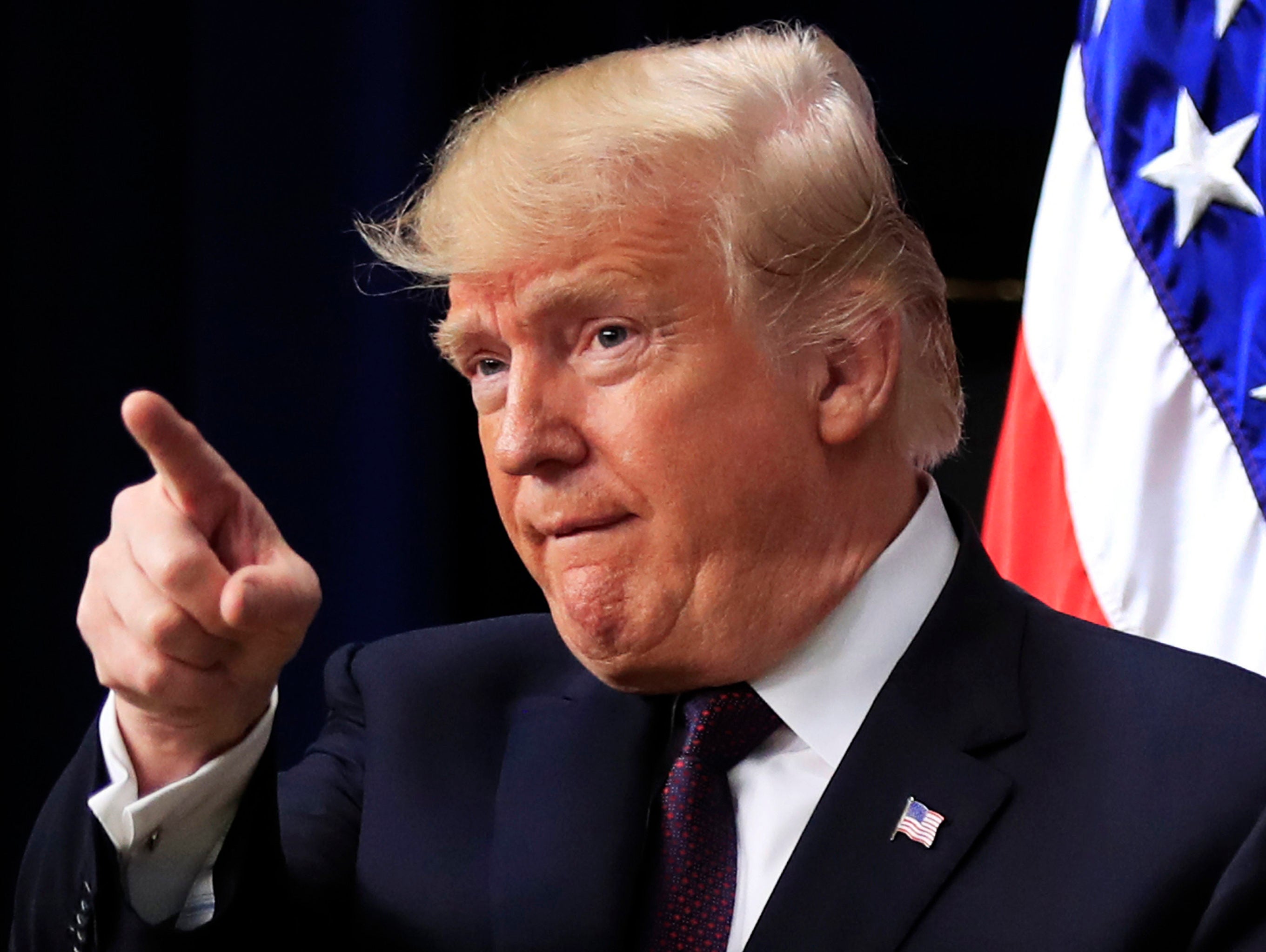
ProPublica, a non-profit investigative news operation that has won six Pulitzer Prizes in its 12-year history, was a major beneficiary of the so-called ‘Trump bump’.
In the four years since Donald Trump entered the White House as president of the United States, ProPublica’s revenues (nearly all of which come from donations) and headcount have nearly tripled.
Joe Biden’s recent victory in the 2020 election, therefore, creates some uncertainty for ProPublica.
Like the newspaper groups that gained millions of new subscribers under Trump’s presidency, and the broadcasters whose ratings have picked up, ProPublica faces a somewhat anxious wait to see whether there is any such thing as a ‘Trump slump’.
“We definitely had a very, very significant Trump bump,” ProPublica’s president, Richard Tofel, tells Press Gazette. “It began incredibly organically on the evening of the election four years ago. And it accelerated enormously after [Last Week Tonight host] John Oliver, the following Sunday, spent less than five seconds promoting us on his show. But it was an enormous, galvanising thing…
“By next year, we’ll probably be on all measures three times the size of what we were before the 2016 election. So it was by no means only Trump, but Trump definitely helped.”
Tofel, a former Wall Street Journal assistant publisher who has run the business side of ProPublica since its founding in 2008, adds: “One of the things that’s unquestionably true, in my judgement, is that he saved the New York Times. I know the New York Times denies that, or at least they see it differently, but I don’t.
“And he was enormously financially helpful to us as well. I think it’s just too soon to say what ‘after Trump’ is going to look like financially. We’re a very different organisation. As I say, we are three times the size, we are known to much larger audiences, we’ve diversified heavily into local reporting…
“So we’re not the same place, and I’m sure we will not go back to 2016. But how much of an effect, if any, it’s going to have – I’ll be a lot smarter about that in another six weeks. I think it will take some time to know for sure.”
Tofel says he’s already noticed a change in donor behaviour since Biden’s victory. After a “pretty steady” start to the year, and then an eight-month period between March and October of “very strong” donation revenue – “well ahead of last year” – ProPublica experienced a drop-off in November.
“In the last three weeks, they’ve softened a bit,” says Tofel, speaking to Press Gazette on Friday 27 November. “And I don’t know – just to be candid with you – about whether… I think it’s related to the election. And I don’t know yet whether it’s people taking a breather that’s going to be very temporary. Or [if it’s] that people are exhausted, or something else, and that it’s going to be more significant and long-lasting than that…. But a lot of donations occur at year-end, so it’s always at this time of year a little hard to predict.”
On Wednesday 2 December, he writes back with more positive news. On 1 December, which is Giving Tuesday in the US, ProPublica’s online contributions were up 56% year-on-year. The organisation has raised around $32m so far this year and it appears to be on track to surpass 2019’s record haul.
READ MORE: Press Gazette’s latest interviews with news leaders
More than $200m of donations in 12 years
New York-headquartered ProPublica was the brainchild of billionaire philanthropists Herbert and Marion Sandler.
Tofel, who joined ProPublica in 2007 before its public launch, says that in the early years the Sandlers’ donations made up around 85% of the outlet’s revenues. By next year, he expects this figure to have fallen to around 6% if targets are hit.
The table above shows how steeply ProPublica’s revenues have risen since 2008 – when it raised just over $8.5m – and in particular since the 2016 presidential election.
Between 2015 and 2016, the number of ProPublica donors rose from 3,400 to 26,000, taking revenues from $12.9m to $17.2m. In 2019, 32,000 donors helped ProPublica make $33.1m.
In total, according to a review of ProPublica’s annual reports, it generated revenues of $191.6m between 2008 and 2019. Funds raised before launch, and this year’s $32m, take its total revenues to well over $200m.
Tofel says that small donations from individuals were “not a meaningful revenue source for us until the 2016 election, and now very much are. Last year [they made up] 20% of our revenue.”
And he believes they have the “potential to be much more important still in the future” for ProPublica and for other news organisations that seek donations from readers to support their journalism.
Tofel: We treat donors like others treat advertisers

ProPublica president Richard Tofel
Still, for now, large donations from high-net-worth individuals and company foundations remain the key areas of income from ProPublica. Large donors in 2019 included Twitter chief executive Jack Dorsey, the Ford Foundation and the Google News Initiative.
What policies does ProPublica have in place to ensure donors cannot influence editorial coverage?
“I believe quality, non-profit news organisations need to, and generally do, treat donors the same way quality, for-profit news organisations have long treated advertisers,” says Tofel.
“I don’t think this is a new question in that sense. I think if you see it through the prism, or the metaphor, of advertising the way it was in legacy news organisations, it answers almost every question about what proper and improper relationships are between publishers and donors.”
Has ProPublica ever encountered any major issues with donors?
“We’ve drawn a line at saying we’re happy to take people’s support for covering beats,” says Tofel. “Obviously our first preference is for what’s called general support, so we can do whatever we think is best. But we’re happy to take people’s support for beats: here’s money to cover healthcare, here’s money to cover criminal justice, etc.
“We’re not happy, and we do not take, money to cover particular stories. And so we have had a number of occasions over the years where people have said: ‘We’d like to give you this money and we’d like you to write about this particular story.’ And we always say: ‘No, sorry, we don’t do that.’”
Pulitzer Prize history and a British Journalism Award
The millions of dollars of donations have helped ProPublica quickly establish itself as one of the heavyweights of US investigative journalism.
The organisation made history in 2010 by becoming the first online service to win a Pulitzer Prize. It has claimed five in the following years, and shared a British Journalism Award with the BBC for an investigation into doping in athletics.
ProPublica is a news brand in its own right – with a website that claims to attract around 4.2m unique visitors a month – but also regularly works with publishing partners, as it did with the BBC in 2015 and the New York Times Magazine in 2010 for its first Pulitzer.
Tofel, who joined ProPublica in 2007 before its public launch, says one of the key reasons for the outlet’s early success was the decline of newspapers, which became “more willing to collaborate” due to their dwindling resources.
The demise of “legacy news organisations,” he adds, had created “a hole in the market” for investigative journalism.
140 journalists across 11 states
ProPublica started out in 2008 with about 25 employees, all but four of whom were journalists.
By the end of 2016, when Trump was elected to the White House, it had 45 regular news staff (not including temporary employees such as fellows) as well as ten staff working on the business side.
Today, following its Trump bump, ProPublica has a headcount of 140, including 120 regular news staff. It is currently hiring for 34 extra news positions and for four other staff positions.
After starting with a New York base, ProPublica has taken pride in recent years in spreading its journalists across the country. It has offices in Washington DC, Texas, Chicago and the Bay Area. It also has reporters or editors who work from home in Louisiana, Maryland, Massachusetts, Pennsylvania, Vermont, the state of Washington and West Virginia.
Some staff, like Texas-based Jessica Huseman, are rare examples of national reporters based outside of New York and Washington. Others cover local news through titles like ProPublica Illinois.
In addition, not included in its headcount, ProPublica also offers grants to fund reporters for local news outlets across the country through its Local Reporting Network. Launched in 2018, the network currently includes 21 reporters in 19 states.
Tofel describes the wide spread of journalists across the US as a “real opportunity” for ProPublica.
“It’s a real opportunity to spur change at the local and regional level,” he says. “It’s a real opportunity because the problems of the [commercial] press that gave rise to ProPublica in the first place are at their most acute at the local and metropolitan level.
“That’s where the worst problems of the industry are evidencing themselves. The near-collapse in almost all cases of metropolitan newspapers around the country. The heart of investigative journalism in the United States – not all of it, but the heart of it – has for many, many years been metropolitan newspapers, national newspapers.
“The national newspapers, some of them are in pretty good shape. The metropolitan newspapers, almost all of them are in pretty bad shape.”
In praise of the US media’s Trump reporting
ProPublica’s continued expansion into unreported corners of the US seems particularly significant at a time when much of the national press is facing accusations that its journalists are “out of touch” with many Americans.
But Tofel, who is himself based in New York, isn’t sure that criticism is fair. He believes, for instance, that the national media’s reporting on Donald Trump’s White House over the past four years has been strong and influential.
“There’s been a great deal of really good investigative journalism about national affairs and politics and the current administration,” he says. “And I think that has had a significant effect on how all those things are perceived.”
He points to consistently poor approval ratings over Trump’s conduct as president. “I would argue that a lot of it is what people were reading about what was going on. And so I think as we get more distance from this, people will see that the press was more effective than, I think up with our noses right against it, people think at the moment.
“The president had an approval rating of his handling of the economy, basically, that was positive from the first day to the last. And it was considerable.
“And you and I might agree with that or we might not. But for that to be true and for the president to lose the election pretty convincingly by six or seven million votes, that’s remarkable.
“It means something, and it reflects something important. And I think a lot of what it reflects is what’s been reported in the press.”
Picture: AP Photo/Manuel Balce Ceneta
Email pged@pressgazette.co.uk to point out mistakes, provide story tips or send in a letter for publication on our "Letters Page" blog
